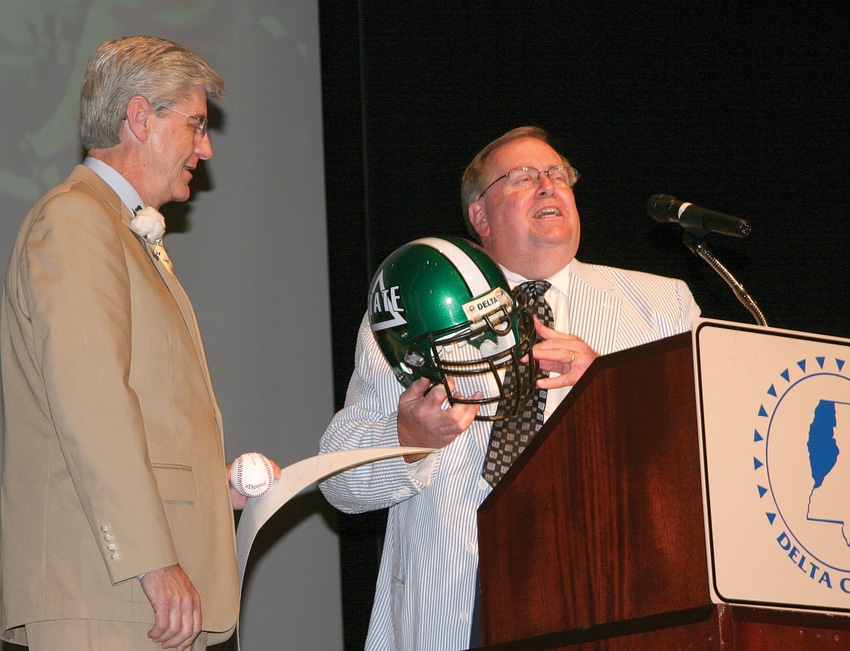
Gov. Bryant: agriculture’s economic role often underrated
Agriculture in the Mississippi Delta accounts for $1.5 billion in annual income and employs more than 55,000 people, says Gov. Phil Bryant. Pledges to grow the state's agribusiness economy.Cites importance of research efforts at Mississippi State University and USDA.
May 14, 2012

Agriculture continues to be the mainstay of the economy in Mississippi and other Mid-South states, and, as such, it should be promoted and protected — not neglected.
That was the message Mississippi Governor Phil Bryant brought to the annual meeting of the Delta Council Friday, a day which many Delta residents couldn’t help but contrast with what was happening in the region almost a year before.
“We had an Agribusiness Summit in Jackson not long ago,” the newly elected governor told an audience of more than 800 assembled in the Bologna Performing Arts Center on the Delta State University Campus in Cleveland, Miss.
“We learned some interesting things, and one of those was that agriculture in the Delta accounts for $1.5 billion in annual income and employs more than 55,000 people. That’s like having 55 Toyota plants,” he said, referring to the new manufacturing facility in northeast Mississippi that is expected to eventually employ 1,000 persons.
“So when I hear people say that if we could only carve out the Delta and give it to someone else how great Mississippi would be… Ohhhhh… they shouldn’t say that around me.”
Gallery: Delta Council's 2012 annual meeting
The governor, who spent holidays and summer vacations visiting his grandparents in Moorhead in the Mississippi Delta, said the region has a long history of producing food and fiber and the Blues and other things that contribute to Mississippi’s heritage.
“So we’re going to work hard to make sure we grow the agribusiness economy here,” he noted, adding that his plan includes eliminating over-regulation and taxation that could slow such economic development.
Another key to growing agribusiness will be expanding the research efforts at Mississippi State University and USDA. “I am so proud of the Stoneville, Miss., complex,” he said. “Very few people in the state realize how important that is to research and development. Stoneville is a world-class example of a successful public-private partnership working hand-in-hand to create a more competitive Delta agricultural industry.”
He commended Lt. Gov. Tate Reeve and the Mississippi Legislature for restoring funding cuts to the Agricultural Extension and Veterinary Medicine budgets at Mississippi State, noting he had recommended additional funding in his supplemental budget recommendation.
“We must continue to invest in our universities,” he added.
On another front, Bryant said the state and Delta Council leaders have been working on a plan to improve the Mississippi and Yazoo River Levee systems to prevent a recurrence of the flooding that occurred in parts of the Mississippi Delta region in the spring of 2011.
Some have compared the 2011 flood to the catastrophe that struck the region in 1927. Bryant referred to the stories his mother told him about the 1927 flood and the impact it had on life in the Delta.
“My father put my mother on the train to Jackson and stayed behind to try to protect our land,” said Bryant. “It was several months before he was able to leave the farm and come to the little apartment where my mother was living in Jackson.”
Without the “superb condition” of the mainline Mississippi and Yazoo levee systems, he said, another failure could have occurred that would have brought “a great disaster upon the Mississippi Delta.”
Despite the efforts of the Mississippi Levee Board and the U.S. Army Corps of Engineers, 200,000 acres of farmland, homes and business were covered by 5 feet of water. The flooding occurred in an area of Warren, Yazoo and Humphreys counties that is unprotected by a levee.
Bryant said the state of Mississippi is working with the Delta Council, the Corps of Engineers and other agencies to construct a new levee along the west bank of the Yazoo to prevent another flood situation like that of a year ago.
“The plan is designed to hold back the floods that occurred along the Yazoo River and around Carter and Rocky Bayou,” Bryant said. “We stand with you to avert these disasters.”
The governor said he will also work with the Corps of Engineers and the Federal Emergency Management Agency to make sure that no levees are de-certified under new rules governing the height of the levees.
During the Delta Council annual meeting, Bill Litton of Greenwood, Miss., was introduced as the 77th president of the organization often referred to as the Delta’s Chamber of Commerce. Litton, president of Greenwood-based Wade Incorporated, will succeed Bowen Flowers, a farmer from Clarksdale, Miss.
Serving as Delta Council vice presidents will be Emily Carter, Rolling Fork, Miss.; Rob Farmer, Cruger, Miss.; Patrick Johnson, Tunica, Miss.; Steve Nail, Greenville, Miss.; Billy Nowell, Cleveland, Miss.; and Bubba Simmons, Hollandale, Miss. Russell Stewart of Anguilla, Miss., will serve as treasurer.
About the Author(s)
You May Also Like





